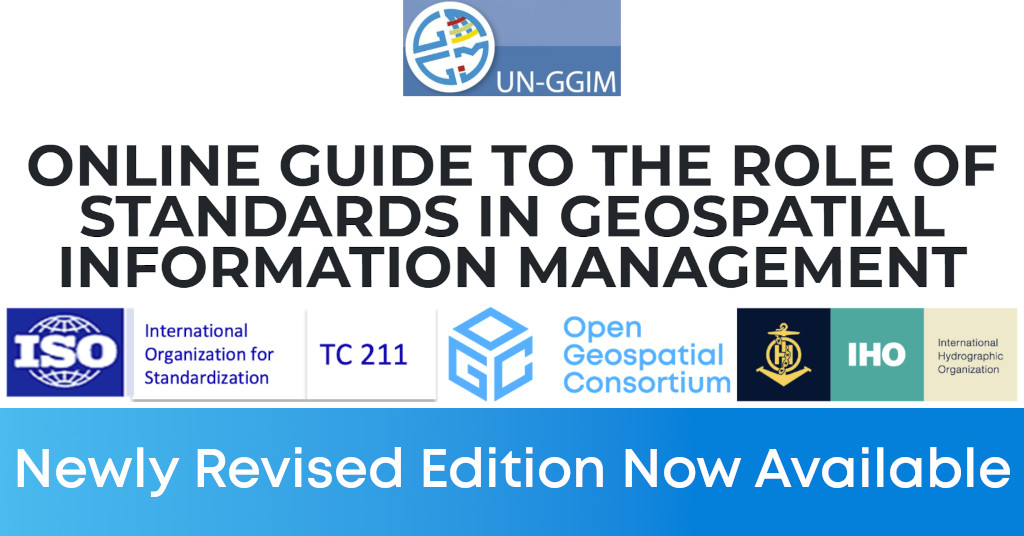Latest revision to the Standards Guide provides recommendations on standards and good practices that ensure that the growing wealth of geospatial data and technologies can be shared, maintained, integrated, and applied.

The Open Geospatial Consortium (OGC), International Organization for Standardization Technical Committee 211 on Geographic Information/Geomatics (ISO/TC 211), and the International Hydrographic Organization (IHO) jointly announce the launch of the 3rd Edition of the Guide to the Role of Standards in Geospatial Information Management (the “Standards Guide”). The United Nations Committee of Experts on Global Geospatial Information Management (UN-GGIM) endorsed this edition during their Eleventh Session in August 2021, in decision 11/111. The Standards Guide is available at standards.unggim.ogc.org.
The Standards Guide, now in its 3rd Edition, provides nations around the world recommendations on the open international standards and good practices necessary to ensure that the growing wealth of geospatial data and technologies can be shared, maintained, integrated, and applied. This will allow policy makers and decision makers to address a range of local to global, social, economic, and environmental challenges. Available now as an interactive web-based resource as well as a downloadable publication, it represents a significant enhancement over prior editions.
The Standards Guide also now aligns with the United Nations Integrated Geospatial Information Framework (IGIF). The IGIF represents a high-level framework for all, providing a “basis and guide for developing, integrating, strengthening, and maximizing geospatial information management and related resources in all countries. It will assist countries in bridging the geospatial digital divide, secure socio-economic prosperity, and to leave no one behind.”
The Standards Guide complements the IGIF Strategic Pathway 6 Standards by addressing in detail the role of standards in geospatial information management by:
- Defining and explaining what a standard is;
- Making the case for open standards;
- Discussing why such standards are valuable;
- Describing geospatial standards and related good practices;
- Identifying the intended audience/roles for those who will benefit from using the Standards Guide;
- Introducing a goal-based approach to standards adoption, and a multi-tiered standardization approach to attaining desired levels of geospatial capability;
- Characterizing emerging standards and trends;
- Providing concrete examples of standards in use; and
- Concluding with helpful resources and suggestions for next steps.
The ISO/TC211, OGC, and IHO collectively form the Standards Development Organization (SDO) team as recognized by UN-GGIM. With the Standards Guide in a more readily maintainable digital form, we will support its regular review, maintenance, and enhancement based on advancements of our respective standards. We invite contributions from the global community for inclusion. These should describe exemplar implementations of standards and other resources of value to implementers in the community worldwide.
The free 3rd Edition of the Guide to the Role of Standards in Geospatial Information Management, and the feedback form, are available now at standards.unggim.ogc.org.
About OGC
The Open Geospatial Consortium (OGC) is a collective problem-solving community of experts from more than 500 businesses, government agencies, research organizations, and universities driven to make geospatial (location) information and services FAIR – Findable, Accessible, Interoperable, and Reusable.
The global OGC Community engages in a mix of activities related to location-based technologies: developing consensus-based open standards and best-practice; collaborating on agile innovation initiatives; engaging in community meetings, events, and workshops; and more.
OGC's unique standards development process moves at the pace of innovation, with constant input from technology forecasting, practical prototyping, real-world testing, and community engagement.
OGC bridges disparate sectors, domains, and technology trends, and encourages the cross-pollination of ideas between different communities of practice to improve decision-making at all levels. OGC is committed to creating an inclusive and sustainable future.
Visit ogc.org for more info on our work.
“
